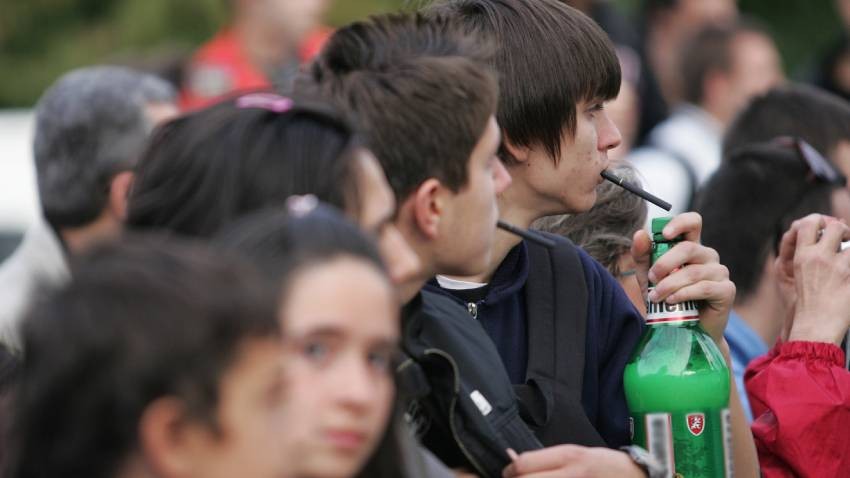Almost 10% of 11-year olds in this country have been drunk at least twice in their lives, 18% of the girls and 13% of the boys have smoked tobacco cigarettes, and 19% of 15-year olds have used cannabis. This is indicated by an international study on the health behaviour in school-aged children (HBSC). In this respect Bulgaria is far ahead of the other countries of Europe, and Canada, where the average index in these age groups is 1% to 3%. Analysts say this disturbing tendency has been deepening.
The causes cited most often are – the relationships at home and in the community which is neglectful of children’s upbringing. Child psychologist Dimitrina Prodanova says that she talks to adolescents every day who use, and sometimes abuse such substances. At the same time, she says she has a lot of talented children coming to her who feel outsiders in society, outsiders in what is known as chalga culture (a specific pop folk music style deemed to be vulgar, lewd and profane) which is not just a music style but a model of behaviour:
“If you go and ask what 11 to 14 year olds in this country dream of, the boys will tell you they want to be gamers, and the girls – most of all influencers. So, what’s going on in their heads? “I want to be popular and to make money, if possible without working”. At school they are bored because they are offered nothing to stimulate their intellectual potential. What they need is an update of the way they are given the information. What happens to an 11-year old if a teacher stands in front of them to teach in a way that is not adequate? The motivation plummets,” says Dimitrina Prodanova. 
Of course, social media have taken their toll. Screen time affects the infant mind and behaviour. That is why adolescents are after new experiences and emotions that are more and more intense.
“A new term has appeared recently – cognitive impatience. Ours are TikTok culture children. Something has to happen within 10 seconds, and then they expect the next simulation, i.e. with this technology that has entered their lives on such a scale, their brains are wired to a different kind of frequencies,” says Dimitrina Prodanova.
What lies at the root of low motivation is low self-esteem which can trigger behavior problems and use of psychoactive substances. But if children are encouraged to believe in themselves at the earliest age, to like themselves and to develop their talents and strong suits, there would be no such tragic statistics, says Dimitrina Prodanova and adds: 
“Bulgarian parents seem unable to create space for their children where they will feel safe, where they will have privacy, where they will be able to communicate with one another. Maybe other societies have a different kind of culture, a different mode of operation. And one more thing: parents in this country do not have the culture to look after the relationship with their partner properly. It is very important for the mother and the father of the child to set aside the time and space for just the two of them so they can “recharge their batteries”. Because happy parents have happy children, problem-free parents will have problem-free children,” says Dimitrina Prodanova.
More:
Translated and posted by Milena Daynova
Photos: BGNES, freepik.com
An event dedicated to the Bulgarian oil-bearing rose (rosa Damascena) will take place on September 19 in Ireland, BTA reports. Its organizer is the Embassy of Bulgaria in the country. “We are pleased to invite you to a unique journey of sound..
The sweet temptation "Garash" is a cake whose history is very curious and deserves the attention of both those interested in history and lovers of its undeniable taste qualities. Its creator is the Austro-Hungarian Kosta Garash. It is believed..
For yet another year, lovers of freshly prepared lyutenitsa will be able to try this delicious culinary masterpiece at the traditional festival, where it is the main character - "Kurtovo Konare Fest". A rich musical program, various workshops, a film..
Stara Zagora is hosting the first U.L.I.C.A. – Street Fest, the organisers from the municipal enterprise Art Stage announced. The event will take..
The sweet temptation "Garash" is a cake whose history is very curious and deserves the attention of both those interested in history and lovers of its..
For yet another year, lovers of freshly prepared lyutenitsa will be able to try this delicious culinary masterpiece at the traditional festival, where it..

+359 2 9336 661
